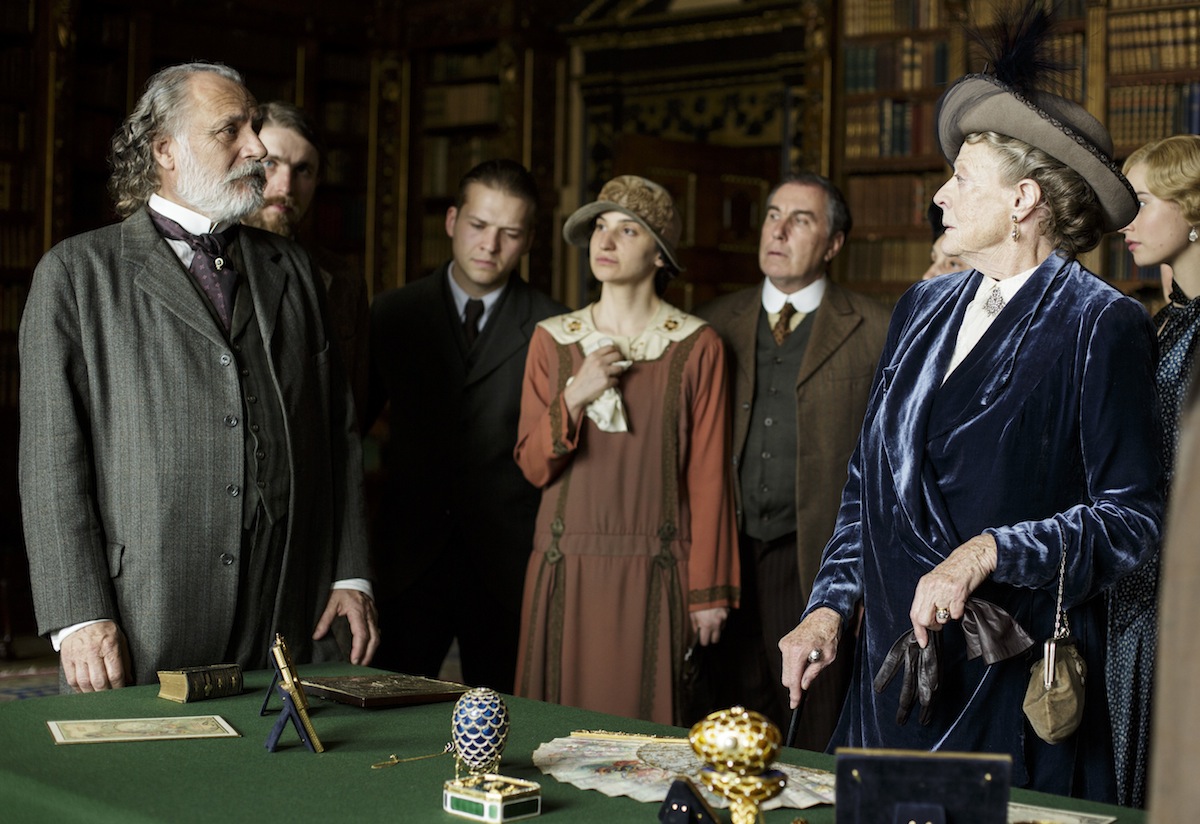
Think Downton Abbey and you probably think “British.” The U.K. import is full of British customs, British laws and British actors speaking with British accents. But, in the episode that aired in the U.S. on Jan. 18, a new accent could be heard on the show. When Lady Rose gets involved with helping “her Russians” feel at home in England by inviting them to tea at Downton, she unwittingly reveals a complicated moment from the Dowager’s past — and perhaps also reveals a bit of confusion about Russian history among viewers.
So who are all these “displaced Tsarist aristos,” as Sarah Bunting phrases it? And why are they getting all emotional in the Crawley family’s library?
The reason can be traced back several seasons in Downton-time. Fans may remember that back in Season Two, when Branson’s revolutionary urges were more active, he mentioned in a 1917-set episode that the Tsar had been denounced and was imprisoned by the people, though he was then sorry when the Tsar was killed. The goings-on this season are the result of that history, even though the Crawley family hasn’t discussed it much in the interim.
What happened was that a pair of revolutions in 1917 had removed Tsar Nicholas II and his family from power, and then put the Bolsheviks, led by Lenin, in charge. Here’s how TIME summed the whole thing up in a 1927 profile of Alexander Feodorvich Kerensky, the man who had held power in between the two uprisings:
1917. Menshevik Kerensky was present in Petrograd when there began a curiously leaderless and random series of riots and disorders among the people and local soldiery. Between March 8 and March 12 these leaderless disorders reached such a pitch that the Duma found the Tsarist authority had vanished and set up a Temporary Governing Committee which two days later became the Cabinet of Prince Lvov in which M. Kerensky was Minister of Justice. Next day representatives of the Duma obtained the abdication of the Tsar. Russians were all but stupefied that the Tsarist regime was so rotten at the core as to topple after four days of disorder in Petrograd. Troops ordered to shoot down the mobs flung away their guns and embraced the rioters. Never was a revolution less bloody.
Soon M. Kerensky became War Minister, and in May he began an extraordinary oratorical campaign which so far restored the morale of the army that it launched a last desperate offensive against Germany in June. When this failed and the army collapsed the power of the Mensheviki became shadowy; but Minister Kerensky as the outstanding Menshevik leader assumed the Premiership which he held for four months.
Meanwhile the Bolsheviki were strengthened by the return of their exiled leaders from Sweden, Switzerland, the U. S. Their strategy was to give expression to a wide spread craving for peace and land. The German general staff so completely understood this that Bolshevik Lenin was hurried from Switzerland across Germany in a sealed railway car. He was injected as a social virus into Russia by Germany.
Between June and November the All-Russian Congress of “People’s Committees” or “Soviets,” composed of delegates from all over Russia, transferred its support from Kerensky and his Menshevik War party to Lenin and his Bolshevik peace-and-land faction. Bolshevik propaganda in the army and navy caused many of the troops to obey Lenin rather than Kerensky.
Lenin was eventually elected president and the Bolshevik (Red) side came to power, driving out their “White Russian” opposition. In 1918, the Tsar and his family were ordered executed, and during the Red Terror of that year, many other counter-revolutionaries and members of the ruling classes were persecuted. (Rumors persisted that the Tsar’s daughter, Anastasia, escaped.) During these years, many members of the Russian elite — whether political leaders or merely wealthy — fled.
Which is how Lady Rose ended up hosting a tea for their fictional counterparts. A family like the Crawleys, firmly rooted in the monarchist tradition of nobility, would be naturally sympathetic to the Russian elites who had been cast out by a new tide of socialism.
That history didn’t stop people like Lady Rose’s Russians from Downton-esque elite disputes: in 1924, the year this episode takes place, a cousin of the late Nicholas II declared himself “Tsar of All the Russias” despite another cousin’s claim to the throne. TIME reported in early 1925 that “a formal feud was opened when the ‘Tsar’ announced, according to buzzing emigre circles in the present capital of Tsarist Russia, Paris, that all those emigres who refused to recognize him as Tsar will be refused admittance by a terrestrial St. Peter when the gates of the Tsarist kingdom are opened.” The threat, however, would never be put to the test: Those real-life Russians and Downton Abbey‘s cast of characters couldn’t have known it then, but the USSR, then newly established, would last for decades. The era of the Tsars was over.
More Must-Reads from TIME
- Cybersecurity Experts Are Sounding the Alarm on DOGE
- Meet the 2025 Women of the Year
- The Harsh Truth About Disability Inclusion
- Why Do More Young Adults Have Cancer?
- Colman Domingo Leads With Radical Love
- How to Get Better at Doing Things Alone
- Michelle Zauner Stares Down the Darkness
Write to Lily Rothman at lily.rothman@time.com